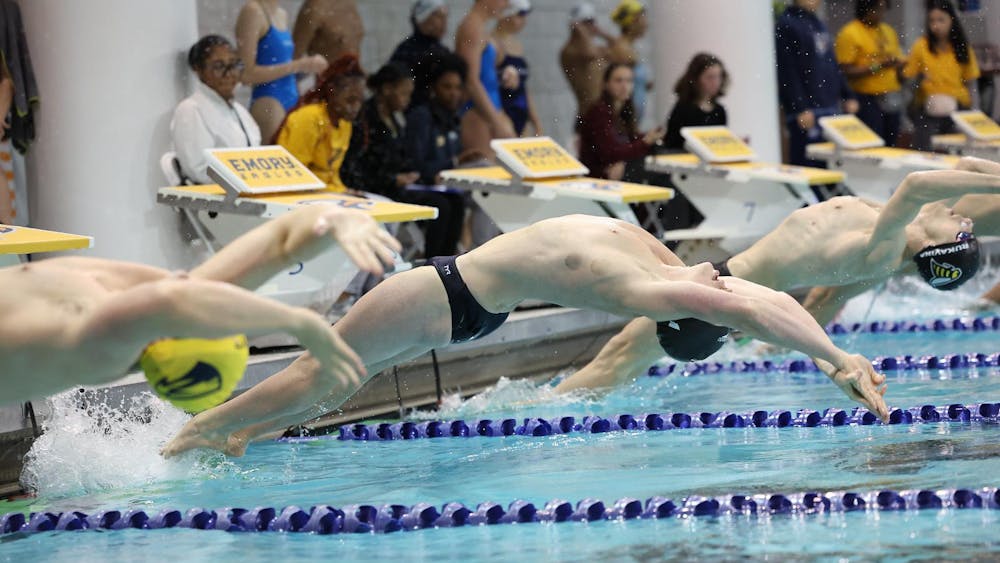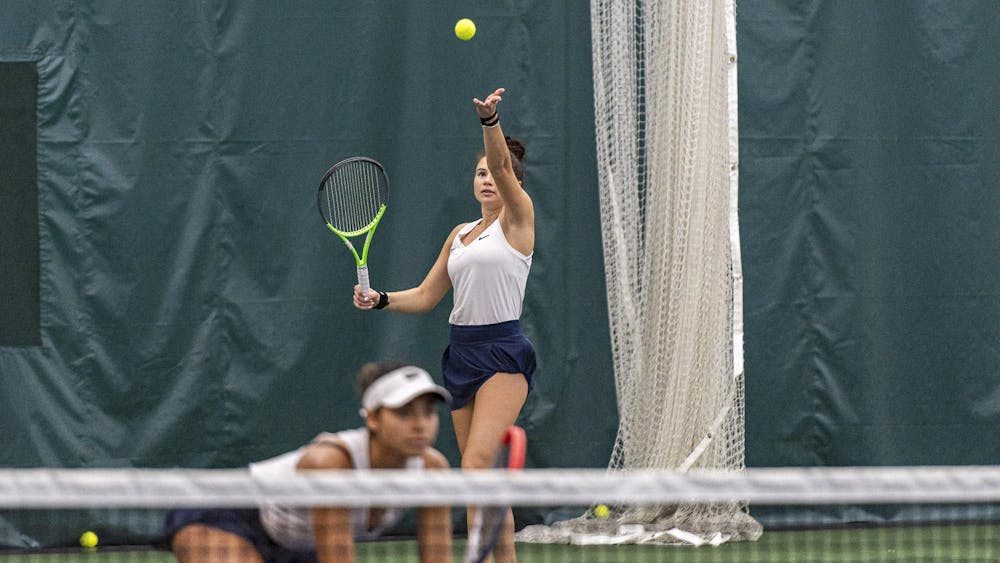[vc_row][vc_column][vc_column_text]In late November, Tim Downes drove his white Ford pickup truck through the tree-lined entrance of Atlanta’s prestigious Westminster Schools with tears in his eyes. “How did this happen to me?” he thought.
Downes, who has been Emory University’s athletic director since 2007, was interviewing for a job as Westminster’s athletic director for seventh through 12th grade, and his eyes showed a flicker of guilt as he described the process. In early January, less than a year after being honored with the Division III Under Armour Athletic Director of the Year Award, he announced his resignation.
“This is the best job in college athletics,” he said in a Jan. 8, 2015 Wheel article. “How often does someone go from one magical job to another?”
Under Downes, Emory’s 18 teams have won 54 University Athletic Association (UAA) titles and eight NCAA Division III national championships. In all but two of his years, the Eagles have been ranked in the top 10 of the Directors' Cup standings, which measure programs’ overall athletic success against their designated NCAA divisions.
Over his eight years, Emory athletes have earned a total of 32 NCAA Postgraduate Scholarships and 50 Academic All-American honors. Add to that numerous physical improvements to the University's athletic facilities, such as the addition of a softball batting cage and the re-surfacing of the indoor and outdoor tracks.
Why is the most decorated athletic director in recent Emory history leaving his collegiate position for one at a high school? One coach suggested that perhaps Downes plans to send his kids to the $25,000 a year school and will receive a discount as a faculty member.
Downes does plan on sending his two preadolescent boys there, but his wife already works at Westminster as the administrative assistant to the upper school.[/vc_column_text][ultimate_heading main_heading="A Timeline" spacer="line_only" spacer_position="middle" line_height="1" line_color="#14385e" line_width="100"]
Major Events in Tim Downes's Career
[/ultimate_heading][icon_timeline timeline_style="jstime" timeline_line_color="#14385e" timeline_layout="timeline-custom-width" custom_width="400"][icon_timeline_feat time_title="1988"]
Graduates from Dartmouth College with a BA in government and English
[/icon_timeline_feat][icon_timeline_item time_title="1993"]
Downes graduates from the Washington and Lee School of Law.
[/icon_timeline_item][icon_timeline_item time_title="1993"]
Downes works as the assistant executive director for compliance and championships in the office of the Patriot League.
[/icon_timeline_item][icon_timeline_item time_title="1995"]
Downes works under his hero and legendary lacrosse coach Bob Scott as the associate athletic director at Johns Hopkins University (Md.).
[/icon_timeline_item][icon_timeline_item time_title="1999"]
Downes takes his first job as an athletic director. He works as the director of athletics, physical education and recreation at the California Institute of Technology.
[/icon_timeline_item][icon_timeline_item time_title="2004"]
Downes oversees 27 intercollegiate teams as director of athletics and recreation at Franklin and Marshall College (Pa.).
[/icon_timeline_item][icon_timeline_item time_title="2007"]
Downes works as the director of athletics and recreation at Emory University. During that time, Emory athletes earned a total of 32 NCAA Postgraduate Scholarships and 50 Academic All-American honors.
[/icon_timeline_item][icon_timeline_feat time_title="2015"]
Downes announces his resignation from his job at Emory and that he will take over as the athletic director of Atlanta’s Westminster Schools.
[/icon_timeline_feat][/icon_timeline][vc_column_text]
Downes’s own explanations carry a theme that his work at Emory is complete. “The one thing I’ve learned is that when you have success, the last thing you do is get comfortable,” he said in the Jan. 8 Wheel article. “In this country, we marvel at comfort, and I don’t think that’s a good thing.” And although Emory’s 12 varsity head coaches have been with the school for an average of 14 and a half years, Downes’s eight-year tenure is a surprisingly long anomaly in his career.
Downes grew up in Baltimore, where he stood out in the classroom and on the lacrosse field. He went on to play on the varsity team at Dartmouth College, while earning degrees in government and English. He then went to work for an investment bank.
“At that time at Dartmouth, they made you feel like the only thing out there was Wall Street and being a consultant or investment banker,” Downes said.
Six months later, he was back at Dartmouth volunteering as a lacrosse coach. Immediately, he was hooked on working in collegiate athletics.
“There is something so cool about teaching somebody something and having them find success with it,” he said. “There’s a real joy in that.”Still, Downes didn’t like yelling at players or calling plays, and wasn’t attracted to a big-time head lacrosse coach career. He began speaking to authorities in the administrative collegiate athletics business and found that the regulation of NCAA compliance rules, such as those defining amateurism and regulating weekly practice hours, was the next big thing in college athletics.
Downes believed that a law degree could help one in almost any field, and enrolled in the School of Law at Washington and Lee University, where he helped coach the undergraduate soccer and lacrosse teams. He passed the Maryland State Bar Association examination shortly after graduation, but as a student who had written an independent research thesis entitled “Title IX and Intercollegiate Athletics,” Downes had his eyes on a career as an athletic director.
Downes secured a job as the assistant executive director for compliance and championships for the Patriot League, a Division I conference that boasts athletic and academic powerhouses such as Bucknell and Colgate Universities. However, conference jobs involve little or no interaction with the athletes and little personal interaction with the coaches. He described his work there as being “too corporate” and closer to investment banking than coaching. Two years later, he took a job under his hero and legendary lacrosse coach Bob Scott, who coached Johns Hopkins to seven national championship titles before taking over as athletic director.
As Johns Hopkins’s brand new associate athletic director at age 29, Downes sat in the office of Scott, who motioned toward the hallway with a large, veiny hand. “Make sure that bathroom door is always shut.”
Although Downes admits he may be overthinking Scott’s words, they carried a mandate he has not forgotten.
“He’d always pick up a piece of trash,” Downes said. “The presentation to visitors and the small things meant something.”At Emory, Downes is frequently spotted in the stands of games — and working out in the school’s gym — and has gone so far as to drive to Shenandoah, Texas, amidst his busy schedule to support the University’s swimming and diving teams as they competed for another national title.
From Hopkins, Downes wanted to be the head athletic director at a great school, and went on the California Institute of Technology, a school that rarely accepts students with an SAT math score below 800.
“There were three Nobel laureates on the athletics and recreation committee,” he said. “Athletics gave them social skills and brought the community together.”
The school’s focus was on the right things, Downes said, such as academics and intellectual advancement. And he would have been content staying at Caltech, but something was missing.
 Downes’s philosophy is that athletics complement success, meaning that they should not overshadow academic achievement, but can create conversations that highlight and include it. When a team never wins, however, it can be difficult to tell those other stories. And Caltech tends to lose a lot. For instance, the school’s baseball team celebrated breaking its 10-season, 228 game losing streak in 2013. “Being the athletic director at Caltech is sort of an oxymoron,” he said.
Downes’s philosophy is that athletics complement success, meaning that they should not overshadow academic achievement, but can create conversations that highlight and include it. When a team never wins, however, it can be difficult to tell those other stories. And Caltech tends to lose a lot. For instance, the school’s baseball team celebrated breaking its 10-season, 228 game losing streak in 2013. “Being the athletic director at Caltech is sort of an oxymoron,” he said.Downes applied for his current job at Emory in 2004, but had not yet run an athletic department the size of Emory’s, and the job went to Betsy Stephenson, who had worked at UCLA for seven years.
With family in New England, Downes moved his wife and two children to Lancaster, Pennsylvania, and took the helm of the athletic department at Franklin and Marshall College. “We were probably the first people to ever move from L.A. to Amish country,” he joked.
But two and a half years later, Stephenson had left Emory and Downes received a call. “Whenever a job came open, everybody wanted Tim,” John Curtin, who has coached cross country and track at Emory for three decades, said in the Jan. 8 Wheel article.
Downes was a refreshing change at Emory, Curtin said. While his predecessors did not always respect sports such as cross country, all athletes were equal in Downes’s eyes, he added. “All the sports here are your children,” Downes said. “You’re not going to treat them differently.”
Downes knows almost every Emory student-athlete’s name, and doesn’t see himself as their superior. “I feel uncomfortable when you call me ‘mister’,” he said as I sat with him at a campus Dunkin’ Donuts.
Among Downes’s many contributions, his care for his student-athletes stood out. “He always wanted to make sure the student-athlete experience was the best it could be,” women’s basketball Head Coach Christy Thomaskutty said.
Early in Downes’s career, he envisioned working at a school that succeeds across the board, and Emory gave him that opportunity. “Emory, top-to-bottom, is people who want to be the best,” he said. But he couldn’t resist a new, unique opportunity at Westminster.
A committee of coaches, student-athletes and University administrators has been assembled to pick Emory’s next athletic director. They will not be searching for a specific sort of leader to take Downes’s place, said Thomaskutty, who is a member of the search committee. Rather, they want someone who can take what Downes has done to the next level.
Downes cracked a smile. “It looks so good, I might apply for this Emory job again.”
Although it is at the high school level, Downes’s new job won’t necessarily be easier than his one at Emory. Georgia is known for ultra-competitive high school athletics and critical alumni. Over the past 15 years, Westminster has won the Georgia Athletic Directors Association’s Directors' Cup, which is awarded to the best high school athletic program in the state, 14 times. And in 2013, the school’s 11 state championships earned it a MaxPreps Cup, which is awarded to the best program in the nation.
“The expectation around a program that has had success is that it will remain successful. And it's that much tougher to find that next gear,” Downes said.
He is not discouraged, however, because that challenge fits perfectly into the thread of his career.
“The key is to understand what has brought the success, bolster it and spread it if necessary,” he said. “And then the fun part: think about what can be next and start to redefine success.”[/vc_column_text][/vc_column][/vc_row]





